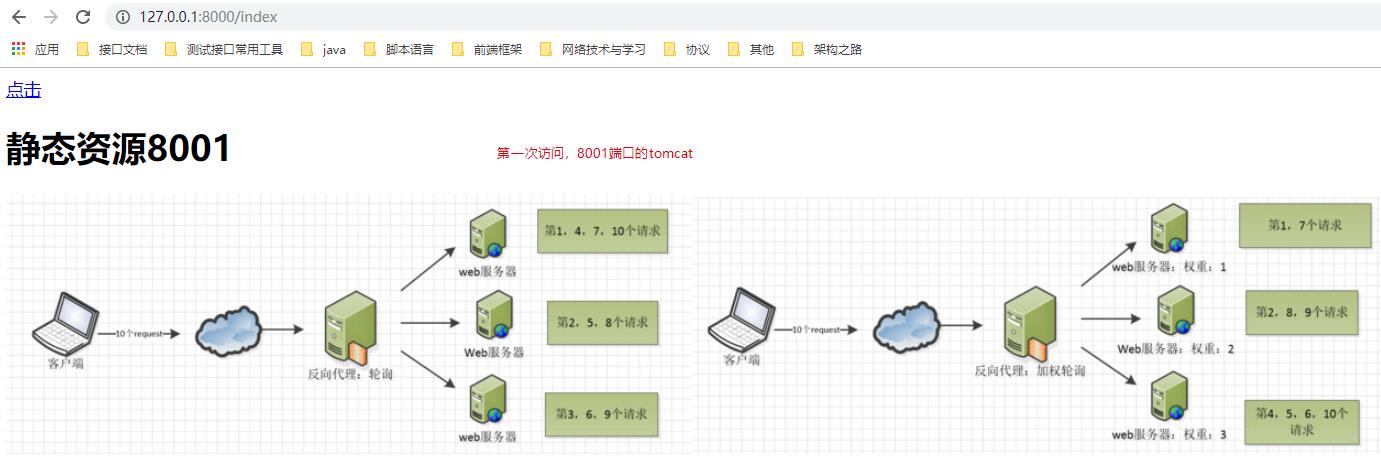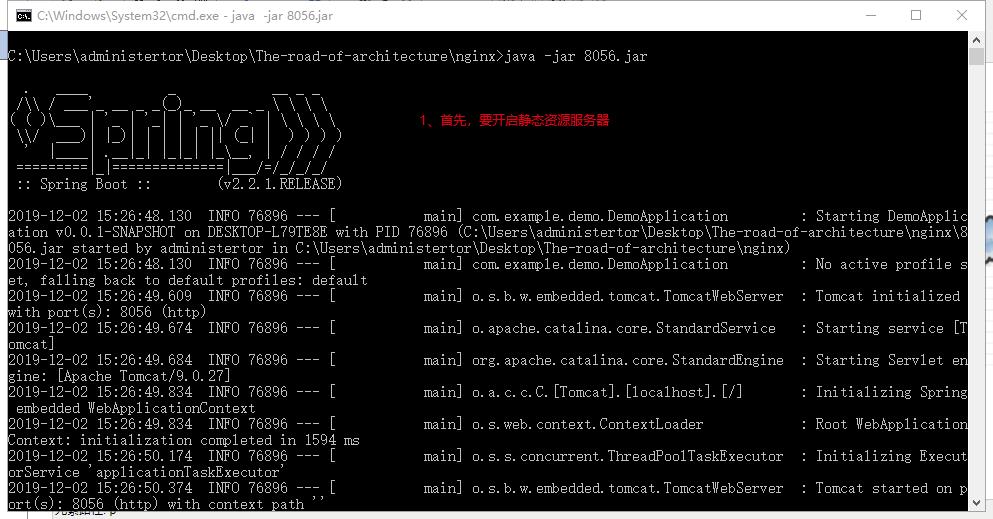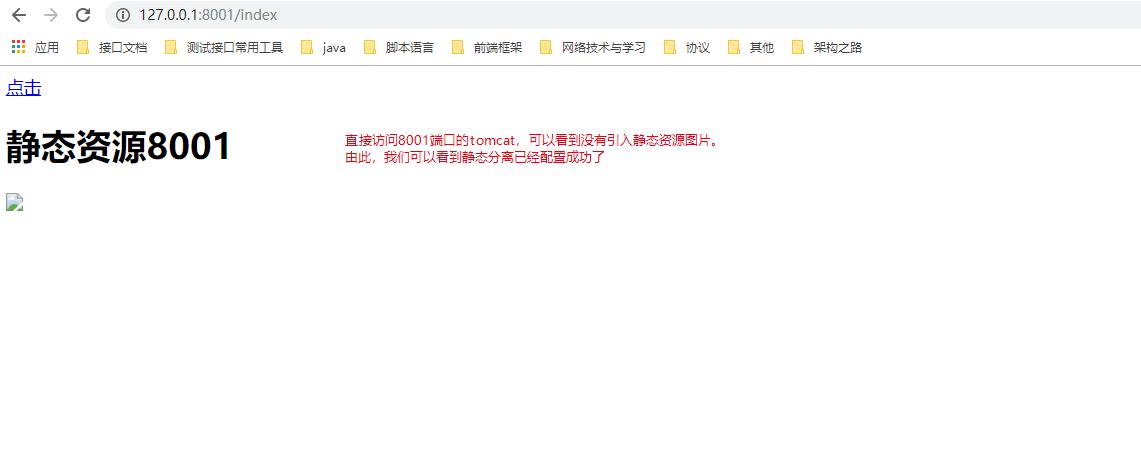nginx集群搭建
Posted LY-留言
tags:
篇首语:本文由小常识网(cha138.com)小编为大家整理,主要介绍了nginx集群搭建相关的知识,希望对你有一定的参考价值。
一、nginx搭建集群入门
https://www.cnblogs.com/XJJD/p/10308840.html
二、Nginx服务器之负载均衡策略(6种)
https://www.cnblogs.com/1214804270hacker/p/9325150.html
三、Nginx与Tomcat实现请求动态数据与请求静态资源的分离
https://www.cnblogs.com/1214804270hacker/p/9299462.html
四、示例
1、nginx.conf 配置负载均衡策略、动态数据与静态资源配置。
#user nobody; worker_processes 1; #error_log logs/error.log; #error_log logs/error.log notice; #error_log logs/error.log info; #pid logs/nginx.pid; events { #accept_mutex on; #设置网路连接序列化,防止惊群现象发生,默认为on #multi_accept on; #设置一个进程是否同时接受多个网络连接,默认为off #use epoll; #事件驱动模型,select|poll|kqueue|epoll|resig|/dev/poll|eventport worker_connections 1024; #nginx默认连接数 } http { include mime.types; #文件扩展名与文件类型映射表 default_type application/octet-stream;#默认文件类型,默认为text/plain #access_log off; #取消服务日志 #log_format main \'$remote_addr - $remote_user [$time_local] "$request" \' # \'$status $body_bytes_sent "$http_referer" \' # \'"$http_user_agent" "$http_x_forwarded_for"\'; #access_log logs/access.log main; #access_log log/access.log myFormat; #combined为日志格式的默认值 #sendfile on;#允许sendfile方式传输文件,默认为off,可以在http块,server块,location块。 #sendfile_max_chunk 100k; #每个进程每次调用传输数量不能大于设定的值,默认为0,即不设上限。 #keepalive_timeout 65; #连接超时时间,默认为75s,可以在http,server,location块。 #tcp_nopush on; #keepalive_timeout 0; keepalive_timeout 65;#连接超时时间,默认为75s,可以在http,server,location块。 #gzip on; #动态服务器组 #1、轮询 #fail_timeout 与max_fails结合使用。 #max_fails 设置在fail_timeout参数设置的时间内最大失败次数,如果在这个时间内,所有针对该服务器的请求都失败了,那么认为该服务器会被认为是停机了, #fail_time 服务器会被认为停机的时间长度,默认为10s。 #backup 标记该服务器为备用服务器。当主服务器停止时,请求会被发送到它这里。 #down 标记服务器永久停机了。 upstream liuyan{ server 127.0.0.1:8001; server 127.0.0.1:8002; server 127.0.0.1:8003 backup;#backup热备:如果你有2台服务器,当一台服务器发生事故时,才启用第二台服务器给提供服务。服务器处理请求的顺序:AAAAAA突然A挂啦,BBBBBBBBBBBBBB..... ip_hash; #可以配置无限多个服务器..... } #2、weight #upstream liuyan{ #ip_hash; #然后根据hash结果将同一个客户端ip的请求分发给同一台服务器进行处理,可以解决session不共享的问题。 #server 127.0.0.1:8081 weight=1;#weight权重,数字越大被使用的几率越高。 #server 127.0.0.1:8082 weight=1; #可以配置无限多个服务器..... #} #静态资源服务器 upstream static{ server 127.0.0.1:8056; #可以配置无限多个静态资源服务器..... } server { listen 8000;#监听端口 server_name localhost; #监听地址 #添加头部信息 #index vv.txt; #设置默认页 #charset koi8-r; #access_log logs/host.access.log main; location / { proxy_pass http://liuyan/; #请求转向liuyan 定义的服务器列表 #添加头部信息 #proxy_set_header X-Forwarded-Host $host; #proxy_set_header X-Forwarded-Server $host; #proxy_set_header X-Forwarded-For $proxy_add_x_forwarded_for; #deny 127.0.0.1; #拒绝的ip #allow 172.18.5.54; #允许的ip } #拦截静态资源 location ~ .*\\.(gif|jpg|jpeg|png|bmp|swf)$ { proxy_pass http://static; } location ~ .*\\.(js|css)?$ { proxy_pass http://static; } location ~ .*\\.(eot|svg|ttf|woff|woff2)$ { proxy_pass http://static; } #添加拦截路径和代理地址 #location /api/ { # proxy_pass http://localhost:8001/; #注意:使用代理地址时末尾记得加上斜杠"/"。 #} #error_page 404 /404.html; #error_page 404 https://www.baidu.com; #如果未找到此服务器会跳转到错误页,如百度页面 # redirect server error pages to the static page /50x.html # error_page 500 502 503 504 /50x.html; location = /50x.html { root html; } # proxy the php scripts to Apache listening on 127.0.0.1:80 # #location ~ \\.php$ { # proxy_pass http://127.0.0.1; #} # pass the PHP scripts to FastCGI server listening on 127.0.0.1:9000 # #location ~ \\.php$ { # root html; # fastcgi_pass 127.0.0.1:9000; # fastcgi_index index.php; # fastcgi_param SCRIPT_FILENAME /scripts$fastcgi_script_name; # include fastcgi_params; #} # deny access to .htaccess files, if Apache\'s document root # concurs with nginx\'s one # #location ~ /\\.ht { # deny all; #} } # another virtual host using mix of IP-, name-, and port-based configuration # #server { # listen 8000; # listen somename:8080; # server_name somename alias another.alias; # location / { # root html; # index index.html index.htm; # } #} # HTTPS server # #server { # listen 443 ssl; # server_name localhost; # ssl_certificate cert.pem; # ssl_certificate_key cert.key; # ssl_session_cache shared:SSL:1m; # ssl_session_timeout 5m; # ssl_ciphers HIGH:!aNULL:!MD5; # ssl_prefer_server_ciphers on; # location / { # root html; # index index.html index.htm; # } #} }
2、部署服务器静态资源tomcat容器
容器中放入要使用静态资源,这里就不演示了。
3、部署服务器动态数据tomcat容器
demo结构目录

pom.xml:
<?xml version="1.0" encoding="UTF-8"?> <project xmlns="http://maven.apache.org/POM/4.0.0" xmlns:xsi="http://www.w3.org/2001/XMLSchema-instance" xsi:schemaLocation="http://maven.apache.org/POM/4.0.0 https://maven.apache.org/xsd/maven-4.0.0.xsd"> <modelVersion>4.0.0</modelVersion> <parent> <groupId>org.springframework.boot</groupId> <artifactId>spring-boot-starter-parent</artifactId> <version>2.2.1.RELEASE</version> <relativePath/> <!-- lookup parent from repository --> </parent> <groupId>com.example</groupId> <artifactId>jar</artifactId> <version>0.0.1-SNAPSHOT</version> <name>jar</name> <description>Demo project for Spring Boot</description> <properties> <java.version>1.8</java.version> </properties> <dependencies> <dependency> <groupId>org.springframework.boot</groupId> <artifactId>spring-boot-starter-thymeleaf</artifactId> </dependency> <dependency> <groupId>org.springframework.boot</groupId> <artifactId>spring-boot-starter-web</artifactId> </dependency> <dependency> <groupId>org.springframework.boot</groupId> <artifactId>spring-boot-starter-test</artifactId> <scope>test</scope> <exclusions> <exclusion> <groupId>org.junit.vintage</groupId> <artifactId>junit-vintage-engine</artifactId> </exclusion> </exclusions> </dependency> </dependencies> <build> <plugins> <plugin> <groupId>org.springframework.boot</groupId> <artifactId>spring-boot-maven-plugin</artifactId> </plugin> </plugins> </build> </project>
页面:
<!DOCTYPE html> <html lang="en" xmlns:th="http://www.thymeleaf.org"> <head> <meta charset="UTF-8"> <title>tomcat</title> </head> <body> <a th:href="@{/msg}">点击</a> <h1 th:text="${msg}"></h1> <h1>静态资源8001</h1> <img src="/m.jpg"/> </body> </html>
Controller:
package com.example.jar.controller; import org.springframework.stereotype.Controller; import org.springframework.ui.Model; import org.springframework.web.bind.annotation.GetMapping; @Controller public class DemoController { @GetMapping("/index") public String index(){ System.out.println("==========》请求路径成功!"); return "indexPng"; } @GetMapping("/msg") public String msg(Model model){ model.addAttribute("msg","欢迎访问8001服务器"); return "indexPng"; } }
application.properties:
server.port=8002
4、演示demo负载均衡(轮询策略)


5、demo静态分离



链接:https://pan.baidu.com/s/1cneWTovv99pPZoAssaphcg
提取码:3cip
以上是关于nginx集群搭建的主要内容,如果未能解决你的问题,请参考以下文章